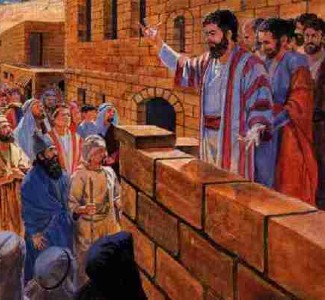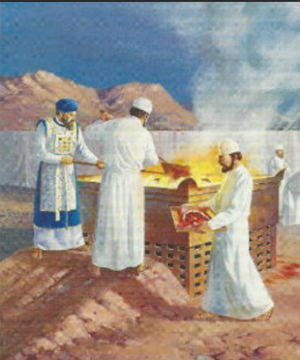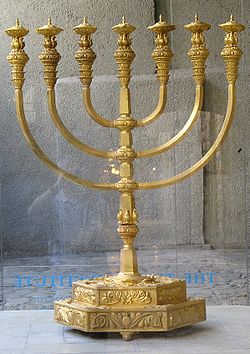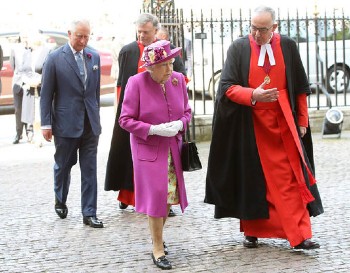The Man Who Missed Going to Church
By Neil Earle
 Peter preaching on Pentecost: Heard any good sermons lately?
Peter preaching on Pentecost: Heard any good sermons lately?Amid this Covid-19 crisis a lot of churches are closed down.
That is one bad side-effect. An even worse one would be if many church-goers got out of the habit of attending church services all together.
No church leader ever taught that missing church is a good idea. The opposite is the case. From St. Paul’s counsel not to forsake assembling together (Hebrews 10:25) to the vision of massed crowds before the throne in Revelation, the Bible reminds us that salvation is individual but it is also communal. Communal, communicate, communion – Christians place a lot of stress on that last word. Preachers and teachers expostulate on the importance of our lips physically touching the wine or grape juice and the bread being chewed and ingested inside us – these are visible tangible symbols but also kinetic reminders of individual spiritual realities that help organize our Christian lives.
Yes, zoom services are filling a vital need and some of them are quite inspiring and timely, but we can never discount the dramatic effect of seeing and standing next to other worshippers who share our values and commitment. Others who may need comfort and shared hope from fellow-pilgrims along life’s weary way.
Bible Examples
In one spectacular moment in Judah’s history when the nation was in danger of being overrun, the King, Jehoshaphat, called a solemn assembly. “All Judah stood before the Lord,” records 2 Chronicles 20, “with their little ones, their wives, and their children.” This crucial Old Testament church service, which resulted in the nation’s deliverance, is matched in the New Testament by St. Paul’s gratefulness for his reception on his way to face trial in Rome. On the road he was met by believers from the town of Puteoli: “The believers from there, when they heard of us, came as far as the Forum of Appius and Three Taverns to meet us. On seeing them, Paul thanked God and took courage” (Acts 28:15).
“Taking courage.” Yes, the brethren mattered to Paul. Their mere “showing up” gave him hope before facing Nero. This is what Christians like most of all about live church services: fellowship, rubbing shoulders with people of like mind. As the song says, “Hearts can inspire/Other hearts with their fire.”
Call it “crowd dynamics,” call it “herd mentality,” but meeting like-minded people you can see, touch and interact with engenders many positive connections and reminiscences which can stimulate courage. In the old Mediterranean a “holy kiss” (the French still have a secular version) was part of church life back in the First Century. 1 Peter 5:14 shows one of five exhortations along those lines for early saints. It’s hard to do that over Zoom. So if we feel bad about not meeting with other believers in person during these virus lockdowns, then, that’s good. It’s a pointer, maybe an index of how much we miss the brethren, an example of “good guilt.”
 In David’s day, the main sanctuary was the tabernacle Moses had erected in the wilderness, where the Levites made sacrifices on the altar.
In David’s day, the main sanctuary was the tabernacle Moses had erected in the wilderness, where the Levites made sacrifices on the altar.“Where Two or Three Are Gathered”
With all this in mind, let’s look at the heartfelt expressions of an Old Testament saint (who was also a sinner) and one who missed church badly. He was a fervent servant of God with a gift for expression. His name was King David of Israel. He wrote many short songs that we call the Psalms. Some of them are classics of literature to this day: “The Lord is my Shepherd,” “Unless the Lord had been on our side,” “your words are sweeter than honey,” and “my God, My God, why have you forsaken me.”
Though the Psalms come in many and varied mini-collections – from nature psalms, to pilgrim psalms to penitential psalms – the section from Psalm 16 to 41 is a good kick-off. It has been described as “Christ in the middle of his people, carrying out his work of Sanctification.”
Here we meet the man who missed going to church. This ardent worshipper lamenting being cut off from attendance by either war, family troubles, persecution or sickness and disease. The words are particularly rich and eloquent about how a true God-worshipper misses being a participant in the assembly of God’s people, in a place set apart for nudging our thoughts upward. In David’s day, the main sanctuary was the tabernacle Moses had erected in the wilderness. After all, Jesus himself had said, wherever two or three are gathered together I am in the middle of them. What a blessing!
“The Pleasure of His Company”
Let’s start with Psalm 16.
After opening with a plea for God’s protection (he is probably hiding out from a rebellion against his throne), David is moved to remember the people of God, “the holy ones in the land.” David, a man of character and dedication to God, is drawn to other people who serve the Lord. “Those who are noble plan noble things, and by noble things they stand,” wrote the Prophet Isaiah (32:5) and truly it is the churches of the world who do so much for others. They organize food banks, staff voluntary organizations, visit the down and out on skid row, support overseas missions – from digging wells in Bangladesh to leaking Bibles into “closed countries.” You can’t help but feel more noble and elevated when you’re around such people and most churches have lots of them, thank God.
Fellowship is high on the list of people who seek out the pleasure of God’s Company in church.
 A reconstruction of the Menorah of the Temple created by the Temple Institute (Wikipedia photo)
A reconstruction of the Menorah of the Temple created by the Temple Institute (Wikipedia photo)The rough but elegant structure called the tabernacle in the wilderness that God had Moses build, was a perpetual reminder to David that God himself had a temple and that physical model made the Holy One more real to him. That is why Psalm 18:6 records David’s habit of calling out to God using that symbol. “In my distress I called upon the Lord, to my God I cried for help. From his temple he heard my voice, and my cry to him reached his ears.” Going to church in a building dedicated to the Great God just cannot but make you think of heavenly things – precious knowledge that gets so squeezed out in the hectic give and take of this world and its busy-ness.
Weekly reminders go back as far as the Ten Commandments and are reinforced by the New Testament encouragement to worship “as often as you do this.”
“Help from the Sanctuary”
David hits this theme harder in Psalm 20:2-3 which describes the benefit of bringing a sacrifice, an offering to God. In New Testament terms we bring money which still serves as a physical reminder of the invisible element in our lives.
Much of this teaching leavens the whole Book of Psalms. “As the deer pants for the water brooks, so pants my soul for You, O God. My soul thirsts for God for the living God. When shall I come and appear before God?” That’s from Psalm 42 where David adds how he remembers fondly, nostalgically, lovingly going to the holy festivals with the multitude, “to the house of God” (42:4). He is conscious of his present alienation from God and that bothers him.
In Psalm 43:3 he pleads with God to send out his light and truth to lead him, “let them bring me to Your holy hill, and to your tabernacles. Then I will go to the altar of God, to God my exceeding joy.” In the ancient tabernacle there was a seven-branched candlestick that was always lit. This was in his mind’s eye as he contemplated life apart from God’s people in solemn assembly. The altar conveyed the need to be forgiven of sin. Jesus is the altar for God’s people today (Hebrews 13:10). And he has forgiven each one of us, individually and personally. He promises to commune with us even more directly when we repeat a heartfelt prayer of confession of the kind many churches recite every week.
“Knowledge repeated with the heart as well as the head is not vain repetition,” wrote the great Charles Spurgeon.
 Even the Queen goes to church.
Even the Queen goes to church.“I Was Glad”
The English have the habit on great state occasions of gathering at Westminster Abbey or St. Paul’s Cathedral of playing a great hymn titled “I was glad, glad when they said unto me: We will go into the house of the Lord,” which is a direct quote from Psalm 122.
“Peace be within your walls and prosperity within your palaces” the Psalm adds.
No matter which way we slice it, meeting communally in a specially prepared spot convicts us at a deeper level than we could gain from being by ourselves, as effective as that can be. The experience of making confession humbles us and makes us more malleable in God’s hands; the exchanging of peaceful greetings with our fellow-worshippers reminds us we have friends and allies on this walk; the prayers for overseas missions and successful running of food banks and works of charity remind us of some of what we are about in this large world and wide.
We need church. God grant that this noxious virus will soon end and God’s people can begin once again to pick up the thread of their churchly lives. Yes, God speed that day!